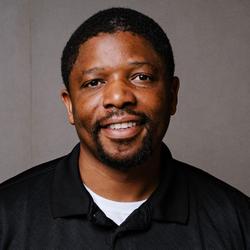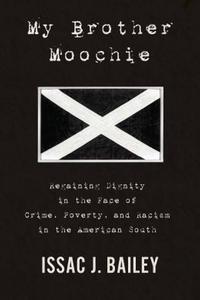
|
|
| photo: Axel Dupeux | |
Issac J. Bailey is a columnist for CNN, Vice and the Charlotte Observer. He's been published in Esquire and Politico and dozens of other publications. He was a Nieman Fellow at Harvard University in 2014 and has taught journalism courses at Harvard's summer school, Davidson College and Coastal Carolina University. He's the author of Proud. Black. Southern (but I Still Don't Eat Watermelon in Front of White People) and My Brother Moochie: Regaining Dignity in the Face of Crime, Poverty, and Racism in the American South (Other Press, May 29, 2018).
On your nightstand now:
I seem to be in a period of re-examination, one during which I'm searching for deeper understanding of some of the most vexing problems facing us. That's probably why on my nightstand you'll find White Rage by Carol Anderson, Stamped from the Beginning: The Definitive History of Racist Ideas in America by Ibram X. Kendi and We Were Eight Years in Power by Ta-Nehisi Coates. In writing My Brother Moochie, I had to admit to some painful, even embarrassing, thoughts I've had about people who look like me. I want to get to the root of that kind of thinking to help my two kids, and my students, commit to that kind of self-examination much earlier in life than I did.
Favorite book when you were a child:
A Connecticut Yankee in King Arthur's Court by Mark Twain was the first book that grabbed me and wouldn't let go. The language and imagery brought me in and convinced me writing could be my most effective way to communicate with the world. That was particularly important because I was grappling with a severe stutter that threatened to silence me.
Your top five authors:
My top five: Ralph Ellison because he wrote Invisible Man; Twain for A Connecticut Yankee; Maya Angelou because we both know why the caged birds sing; Elaine Pagels because she forced me to reconsider how I viewed a religion I had grown up with; and Leonard Pitts because of his fearless style of writing.
Book you've faked reading:
War and Peace by Leo Tolstoy
 Book you're an evangelist for:
Book you're an evangelist for:
I may be exposing my geek side a bit here, but it's Genome by Matt Ridley. I've found that you can better understand the sociological problems I most often contend with in print if you have a firm grounded in the harder sciences, and Ridley's book helped provide that grounding because of his clear writing on an extremely technical subject. That's why I know popular solutions for broad problems, such as urging everyone to have low-cholesterol diets, can have unintended consequences on something as seemingly unconnected as who commits violent acts.
Book you've bought for the cover:
I know I've done that, at least once. I can still remember the Barnes & Noble in Myrtle Beach, S.C., where a book captured my eye. I remember the cover had a lot of red ink over a dark background. It looked cool. I bought it. But the cover was the only memorable thing about it. I've honestly forgotten its title or what it was even about. I don't mind, though. I've never regretted buying a book, even ones I ended up hating--or forgetting altogether.
Book you hid from your parents:
I never did. I was fortunate to grow up in an environment in which the more often I had a book in my hand--no matter the title, no matter the subject--my cache went up. In fact, I read and openly carried books so often my mom bought me a briefcase in high school because she was convinced that meant I was going to be a professional one day and wanted me to start getting used to the idea then.
Book that changed your life:
There will never be another book like Invisible Man by Ralph Ellison. Twain interested me in the craft of writing; Ellison introduced me to layers of humanity that not even a four-year degree in psychology did. The subject matter is centered on a young black man navigating a crazy, racist world, but the characters were so well-written, the story so well-developed, anyone who cracks open those pages could see herself in them.
Favorite line from a book:
"All my life I had been looking for something, and everywhere I turned someone tried to tell me what it was. I accepted their answers, too, though they were often in contradiction and even self-contradictory. I was naive. I was looking for myself and asking everyone except myself questions which I, and only I, could answer." That's from, you probably guessed by now, Invisible Man.
Five books you'll never part with:
Invisible Man by Ralph Ellison and Genome by Matt Ridley are on my list, as is The New Jim Crow by Michelle Alexander because of how it helped reshape our debate about the need for criminal justice reform.
I recently read Being Mortal by Atul Gawande and would not let that one go. He uses the power of narrative nonfiction to explain important but complex medical issues to readers. It's personal for me because such things become more personal when you spend time in a hospital bed not sure you'll ever leave that place alive, which happened to me in 2014, and because as a journalist I spent several years studying the health care industry.
The Autobiography of Malcolm X helped show me what a passionate, relentless pursuit of truth looked like, even through fits and starts. I hope some of that rubbed off on me.
Book you most want to read again for the first time:
The Bluest Eye by Toni Morrison. For reasons that still escape me, I had trouble getting into that book initially. Now that I have fresh eyes and am in the midst of re-examining my thinking, I'm wondering how it would land on my brain today. I'm going to find out.
Book you want to write:
You mean other than My Brother Moochie and one that included a subtitle talking about watermelon and white people? I want to write one about Michelle Obama's roots in a way that only a black, stuttering journalist who grew up in a tin can of a mobile home in the part of South Carolina near where her roots reach can.

